It was May 2 — approximately six weeks into the coronavirus pandemic — and the Island was on edge. Town offices, libraries, schools and retail stores were closed. Construction sites, the center of the Island’s off-season economy, were strictly limited. The Steamship Authority was facing the prospect of financial ruin and boats not running due to operational shortfalls. Bluntly-worded emergency letters were hand-delivered to Gov. Charlie Baker.
Vineyarders, cooped up in their homes during the rainiest and coldest April in recent memory, were worried. An eerie quiet had descended over an Island normally readying for its summer thaw.
March had brought an unusual, approximately 4,500-person growth in population on the Vineyard, despite warnings from the governor that seasonal residents should stay away from the Islands. With 25 beds and three intensive care units, the hospital was at risk for being overwhelmed. Hotels were assessed for quarantine capacity. The Martha’s Vineyard Arena was evaluated for use as a temporary morgue. Three Covid-19 positive individuals had been transferred off the Island. One hadn’t made it back.
The traditional rites of a Vineyard summer — including the Agricultural Fair, Illumination Night, the Oak Bluffs Fireworks and the Edgartown Fourth of July Parade — had all been canceled. The Oak Bluffs summer ferry terminal would open late. Beaches would have limited capacity.
The Island, a frog-shaped rock molded by millennia of ancient glaciers, was in the midst of a new kind of rapid transformation, one that was taking place not over the span of centuries but in the course of weeks. No one knew what lay ahead.
That’s why, when the sun rose on Saturday, May 2, revealing the rubble of the iconic Lucy Vincent cliff’s tumble into the sea, it felt as though the culmination of an epoch’s worth of forces battering the Island had come crashing down overnight.
Longtime Chilmark resident Helen Neumann, who was doing her daily, early-morning beach walk, was one of the first to witness the landscape of summer forever reshaped.
Ms. Neumann did the only thing she could.
“It . . . felt like a blow to my heart,” Ms. Neumann said at the time. “I cried.”
•
A year unlike any other, 2020 brought with it sweeping change and challenges normally only felt on a geological time scale: a global pandemic, nationwide protests against police violence, an Islandwide lockdown, an altered summer, economic turmoil, a historic presidential election, pestilence in the ponds, drought in the forests — and the localized resurgence of a pandemic that continues unabated.
It also inspired an unprecedented outpouring of philanthropy and activism, as Islanders came together to address the pandemic’s dire impacts on hunger, homelessness, unemployment, and to rally for racial justice. Vineyarders found ways to create, to laugh, to love, to explore and to connect during a time when it seemed otherwise impossible, discovering new beauty in an Island faced with unprecedented tragedy.
But as 2020 comes to a close, perhaps no event characterized the year’s coalescence of forces — both natural and anthropogenic, mundane and sublime — than the collapse of the fabled cliff at Lucy Vincent early on that Saturday morning.
The spire, formed over thousands of years, had become its own symbol of the Vineyard’s resilience and fragility. Like a sentry stationed just outside the castled clay cliffs and barrier beach, it quietly stood watch against the persistent nibble of a capricious sea, and guarded against the unrelenting vagaries of a mainland world only seven miles away. It seemed, despite changing tides, that it would stand forever.
Then came 2020.
•
An Edgartown couple returned home in mid-February after being marooned for more than three weeks on a cruise ship in Southeast Asia.
The couple, Tom and Dianne Durawa, became the first Islanders to quarantine as a result of the coronavirus. Neither of them contracted the virus, and Island health officials, while closely monitoring the couple, put a damper on concerns.
“The relative risk of contracting coronavirus remains low,” the Martha’s Vineyard Hospital said in a press statement.
Over the next month, the Island largely went about its business. Beck and Norah Jones would headline the second annual Beach Road Weekend music festival, it was announced. The regional high school put on an ambitious production of Big Fish, the musical. And a new, four-footed visitor was caught on camera. Coyotes, it appeared, didn’t have to quarantine.
•
January and February had also brought their share of community challenges. A scandal involving a sexual harassment settlement and an FBI probe into the Oak Bluffs fire department’s ambulance billing practices ultimately led to the resignation of town fire chief John Rose. A series of operational mishaps prompted longtime Vineyard Steamship Authority governor Marc Hanover not to reapply for the position. Chilmark selectman James Malkin was appointed to the seat.
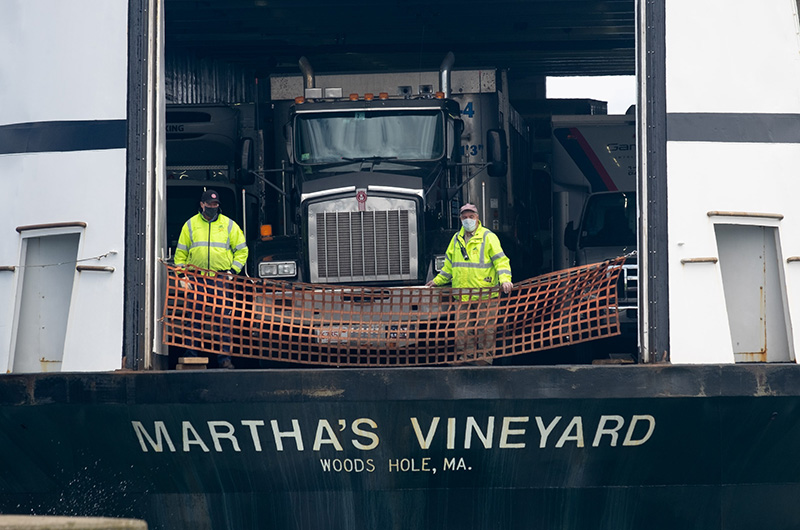
Tensions came to a head regarding The Trustees management of the historic Katama Farm. And the Martha’s Vineyard Striped Bass and Bluefish Derby committee voted to remove striped bass from the competition, as stocks of the namesake fish reached precarious lows.
In other words, it was shaping up to be a normal off-season on the Island.
But by early March, the world began to change. National and state emergency orders were enacted. The first cases of the virus began popping up in urban centers: New York, Chicago, Boston. Phrases like social-distancing and contact tracing entered the national vernacular.
And the Island too began feeling reverberations. Schools agonized over canceling spring ski trips. Offshore Ale stopped offering free peanuts.
“This is really serious,” hospital CEO Denise Schepici said in an interview with the Gazette. “And we need people to take this seriously.”
•
That was Thursday, March 12. One day later — on Friday, March 13 — people started to listen.
Governor Baker declared a state of emergency. Within a span of hours, eggs, milk, bread and toilet paper began flying off the shelves at Island grocery stores. Steve Bernier made the difficult decision to close his up-Island Cronig’s store. Farm stands, like Grey Barn and Morning Glory, turned into grocery stores. Grocery stores turned into panic rooms.

“I have been doing retail for 57 years,” Mr. Bernier said at the time. “And I have never seen anything like this.”
By the following Monday, all Island towns had entered emergency preparedness protocols, closing town offices and transitioning to a newfangled form of video-conferencing called Zoom. More than 2,300 kids began a year-long saga known as remote learning. The hospital shut its doors to all non-essential visitors and personnel, and moved its ER to a temporary, outdoor triage tent. Two lines formed: one for those with Covid-19 symptoms, one for those without.
New developments occurred by the hour. On Friday, March 19, Island health agents announced the first positive Covid-19 patient.
Statewide stay-at-home orders were instituted, and Vineyard officials, in an unprecedented show of unity, met on weekends or late at night to enact stricter regulations. Following in the footsteps of Nantucket, they approved an Islandwide construction moratorium, setting up a showdown with Gov. Charlie Baker over its legality. The governor, who was under other pressures, later relented.
The Steamship Authority suddenly saw a precipitous decline in travel, causing a financial crisis to snowball out of control. The boat line appealed to the state for a bailout. The governor demurred.
It wouldn’t be until mid-summer when the SSA figured out a solution, with state Sen. Julian Cyr ultimately sponsoring a bill that shifted the liability for the ferry’s budget deficit onto the commonwealth.
•
But the chaos had just begun. Other Island businesses — some already cash-strapped in the final throes of winter — immediately suffered the effects of a work shutdown.
Restaurants, retail outlets, hotels, movie theaters and more laid off hundreds of staff. Island commercial fishermen, unable to sell their catch, either froze it or gave it away. Unemployment skyrocketed. Long lines formed at the Island Food Pantry, oyster giveaways and church food bank distributions.
Some businesses began to shutter, including EduComp in Vineyard Haven and the Dutcher Dock seafood wholesaler Menemsha Fish House.
Others had to either cancel, postpone or give up on foreign staff, leaving hundreds of would-be summer workers stranded in Eastern Europe and the Caribbean.
The six Island towns cut salaries and halted capital projects. Annual town meeting warrants were pared to the essence, with the meetings recast as outdoor affairs.
Coronavirus testing availability remained a huge question mark.
The Vineyard also began to feel the human toll from the pandemic. Gary Jenkins, a longtime Oak Bluffs summer resident, attorney and well-known music executive, died at 58 from complications of Covid-19 in early April. Days later, Lee Fierro, a matriarch of Island theater who founded the Island Theater Workshop, died at age 91 of complications from the virus.
It was Ms. Fierro who had shown the world how to mourn 45 years earlier in her role as the grieving mother Mrs. Kintner in Jaws. The Island finally had the chance to return the favor.
•
The pandemic would go on to affect nearly every facet of life on the Vineyard, changing schools and work places, hospitalizing dozens and infecting more than 500 people.
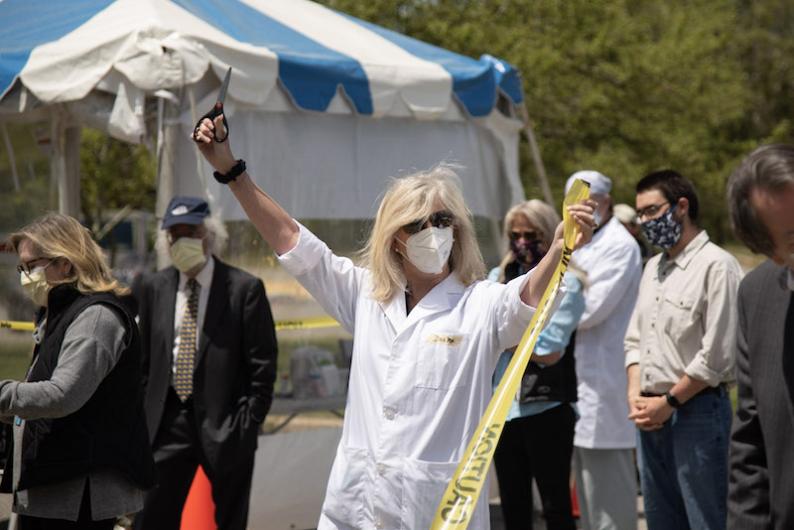
The Vineyard — its soul shaken but spirit unshakable — trudged along. By year-end no full-time Island residents had died from the virus. And although the Island experienced a case surge around Thanksgiving, with clusters connected to an October destination wedding and a Bible study group, the community persevered.
Steve Bernier, the Cronig’s owner who was instrumental in ensuring the Island had an adequate supply of food early in the pandemic, contracted virus when a cluster of cases forced his grocery store to close in mid-November. After being airlifted to a Boston hospital, Mr. Bernier returned home just in time for the holiday. The whole Island was thankful.
As summer was set to begin, a new development provided Islanders with new peace of mind. After striking up a backyard conversation with his landscaper Michael Donaroma, seasonal resident and Quest Diagnostics CEO Steve Rusckowski and his wife Deb O’Hara Rusckowski, a nurse, spearheaded a first-of-its-kind partnership to set up a free Covid-19 test site at the regional high school.
Although the original plan was to stay open through Labor Day and provide about 15,000 tests, TestMV, as the site was later named, has since conducted nearly 30,000 tests and remains open for business even through the Christmas holiday.
“It has unequivocally saved lives,” Ms. Rusckowski told the Gazette in an interview.
•
Case counts remained low throughout the summer, despite a large influx of visitors and seasonal residents of the Island. Traffic was down everywhere on the Island — except at beaches and on the water. Harbors were filled with boats of every description from June through September.
Memorial Day, Fourth of July and Labor Day all came and went, with Islanders focusing on family rather than festivities. Steamship Authority numbers slowly ticked upward. Hospitalized patients slowly ticked down. Real estate sales boomed and inventory disappeared, shattering records in a market that no one thought could become more overheated.
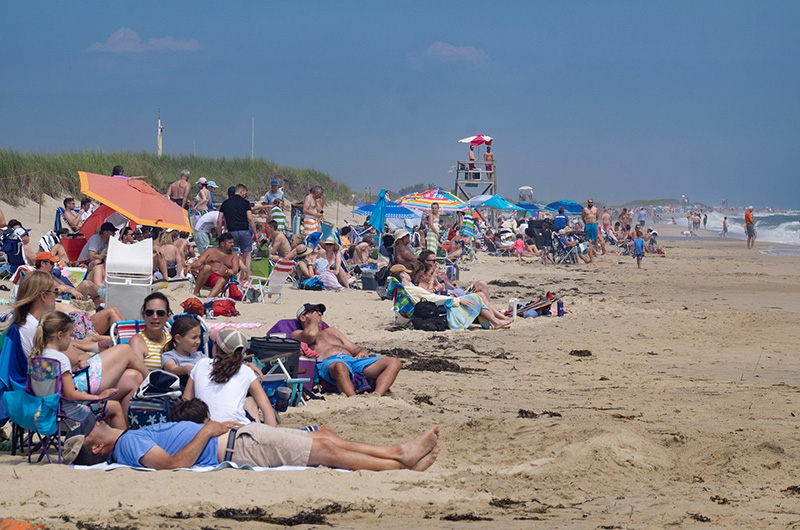
And as it always does, the Island adapted to change in its own way. Edgartown, Vineyard Haven and Oak Bluffs transformed their downtowns, moving restaurants onto sidewalks and moving sidewalks into streets. Businesses struggled, but most survived as the state slow-walked through its reopening process. A Gazette analysis found that hundreds applied for and received Payroll Protection Program loans, preserving thousands of jobs on the Island.
The Martha’s Vineyard Film Festival relocated to the parking lot behind the ice rink, affixing a massive projector and screen to the back of the building and opening the Island’s first drive-in movie theater in decades. Struggling musicians had a stage again.
By December, the first batch of vaccines had arrived on the Island, with frontline health care workers at the hospital receiving the initial shots.
“It’s epic,” said Dr. Karen Casper, who treated patients with the virus and received the first dose. “It’s being a part of history.”
•
Throughout 2020, the seesaw of nature saw its own delicate balancing act.
Dead seals, stinging jellyfish, dead whales and live sea turtles all washed up on the Island shorelines.
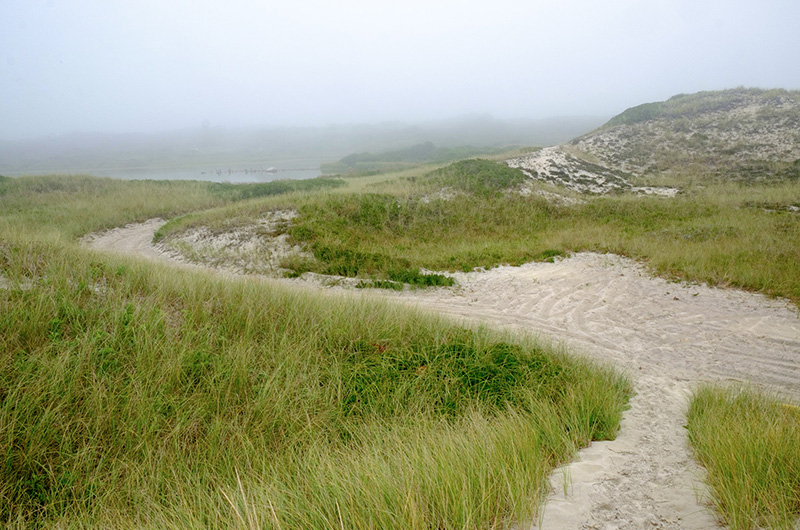
A man was sickened by an algae bloom after crabbing in Chilmark Pond, alarming scientists and Island health officials and prompting further study of cyanobacteria in Island ecosystems.
Millionaire car salesman Ernie Boch’s quixotic plan to build a park on his vacant lot in Vineyard Haven went to the birds, and the birds went to Wasque, with piping plovers and other shore fowl nesting in unprecedented numbers.
The Trustees of Reservations got evicted from Katama Farm. The famed Shenandoah tall ship got new captains.
After the rainiest spring in memory, significant drought struck the Island during the summer, parching the state forest — which remains without a superintendent — just as the American West was plagued with its worst wildfire season in generations. Islanders counted their blessings and their kindling, heading outdoors in unprecedented numbers.
The land bank broke all its records and made a premier purchase, partnering with the Sheriff’s Meadow Foundation to buy a large portion of the Kennedy family’s Red Gate Farm in Aquinnah for $27 million. The sale preserved more than 300 acres of ecologically-rare heathlands, salt marshes and beachfront for public use.
The Island’s age-old debate around development and preservation came to the fore when the MVC denied the 54-lot Meeting House Place subdivision in Edgartown.
“I think that we are seeing that the character of the Vineyard is under even more threat than it was four decades ago when the commission was created,” longtime commissioner Linda Sibley said. “We are in danger of giving up.”
•
Perhaps it was the Vineyard’s human landscape that came into the clearest focus of all. Faced with challenges on a global scale, the Island banded together to address them locally, working tirelessly to preserve the place — and people — it held dear.
By early April, the Permanent Endowment for Martha’s Vineyard, MVYouth and MV Bank had developed coronavirus emergency funds, doling out hundreds of thousands of dollars to Island nonprofits for counseling, child care, food equity and domestic violence services. The funds helped build bridges with the Island’s Brazilian Portuguese population and contractors hit hard by the pandemic work shutdown.
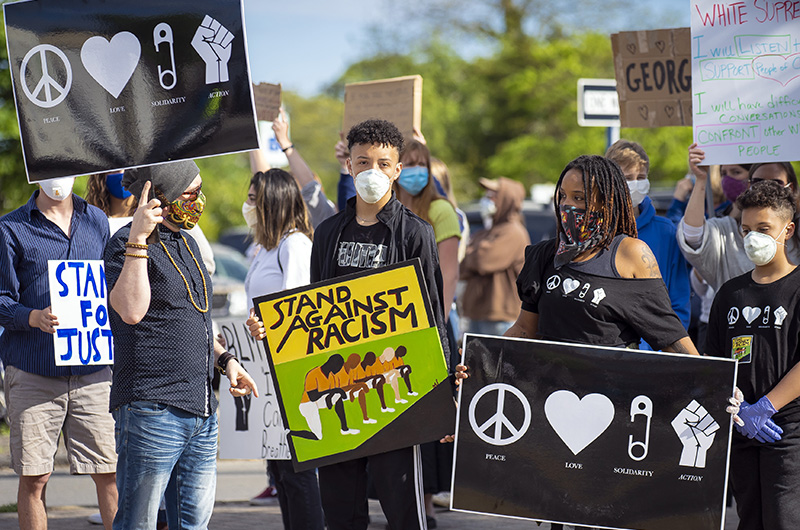
Donors stepped up to ensure TestMV ran smoothly and to support the hospital. Private philanthropists bought thousands of oysters just to give them away. The Red Stocking Fund turned a $40,000 deficit into a $100,000 fund, named after Kerry Alley in a surprise gesture to the organization’s patriarch. Island Grown Initiative and the Island Food Pantry, spurred to collaborate at the onset of the pandemic, announced a formal partnership late in the summer.
And when it appeared as though homeless shelters wouldn’t be able to open for the winter due to coronavirus restrictions, private donors and the hospital pledged $150,000 to find a solution. They settled on the historic Whaling Church in downtown Edgartown as a winter shelter, honoring its storied past as a sanctuary for lost mariners.
As protests against police violence swept the nation in the aftermath of George Floyd’s murder, the Island found its own way to show solidarity, coming together over an issue that left the country deeply divided. Led by a tenacious 15-year-old regional high school student named Graysen Kirk, hundreds of Islanders knelt at Five Corners for exactly eight minutes, 46 seconds.
In Chilmark, a solitary protest started by resident Dana Nunes eventually led to a daily, nearly 50-person gathering at Beetlebung Corner in support of the Black Lives Matter movement. Ripples from her activism were felt across the country.
When the highly-anticipated 2020 presidential election arrived in November, the Vineyard turned out in historic force to write its own chapter in the country’s unprecedented 2020 democratic process. The Island supported former Vice President Joseph Biden by a nearly four-to-one margin.
After a week of waiting, the Polar Bears — their season canceled — spontaneously jumped into the Inkwell in celebration.
•
Change and also loss affected Islanders of all stripes.
Chris Kennedy took his final walk at Wasque in August. Richard Clark said all aboard one last time after 41 years of service for the Steamship Authority. Oak Bluffs summer resident Dawn Davis was chosen to head Bon Appetit magazine. Fishermen’s Preservation Trust executive director Shelley Edmundson was appointed to serve on the state Marine Fisheries Advisory Commission, becoming the first Island member in four decades — and its only woman.
West Tisbury lost two icons in John Alley and John Early. The memory of attorney Dick Renehan, who died in February, is honored every day by the power of the three-acre zoning bylaws he fought to preserve.
Edgartown boat builder Ovid Ward died in June, and Dennis daRosa, the unofficial official mayor of Oak Bluffs, died in August.
Just before Christmas, Islanders mourned the loss of Emma Hall, a 22-year-old who died in a fatal car accident on Beach Road.
Just after Christmas last year, Islanders paid tribute to Nelson Bryant of West Tisbury, the acclaimed New York Times outdoor columnist Army paratrooper who had parachuted into Normandy on D-Day during World War II.
A week after his death, a rare golden eagle was spotted soaring over the Vineyard. Mr. Bryant’s spirit flew on.
•
The year brought at least one welcome new arrival. On Jan. 1, long before masks were mandatory and the Lucy Vincent tower still stood guard, a rusted sea scalloper called the Martha Rose sailed into Menemsha harbor.
For the next 12 months, her three-man crew and owner Wes Brighton steamed out to scallop grounds south of the Island, bringing back thousands of pounds of fresh seafood. When then pandemic hit, they sold the scallops straight from the boat — a weekly ritual of stability when routine had become a privilege of the past.
Although it took millennia for nature to slowly whittle away at the Island’s Atlantic-facing shore, forming the kaleidoscopic clay and sediment tower at Lucy Vincent — it only took one moment to bring the sentry crashing into the sea.
Time will tell what 2021 brings. And if anything was learned from 2020, Martha’s Vineyard can’t let its guard down.
Speaking about the fall of the tower at Lucy Vincent, historian Bow Van Riper summed it up this way:
“In the course of geological change, it’s not even an eye blink.”
Home page picture by Jeanna Shepard: Polar Bears take the plunge at Inkwell Beach after presidential election.

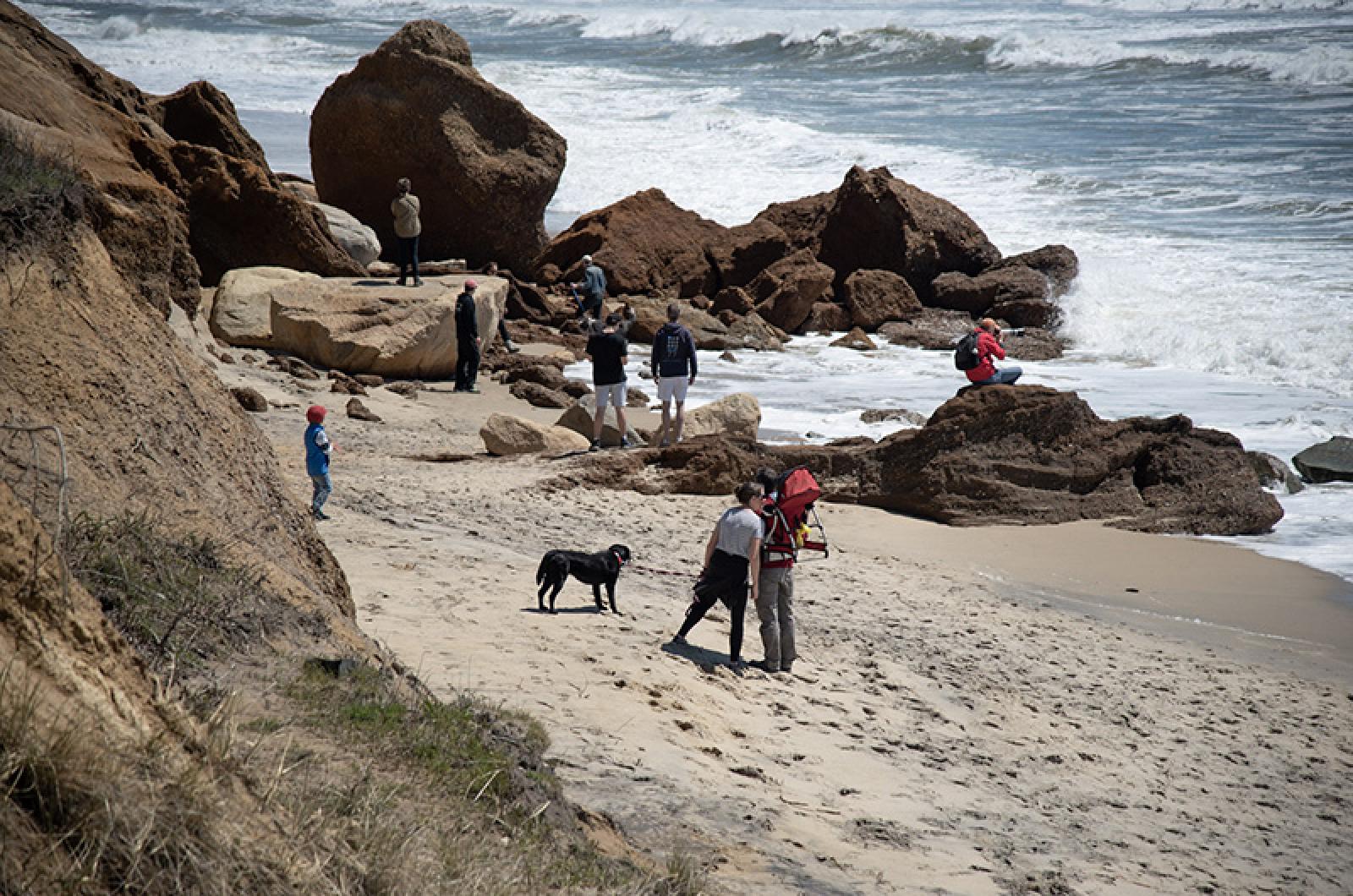
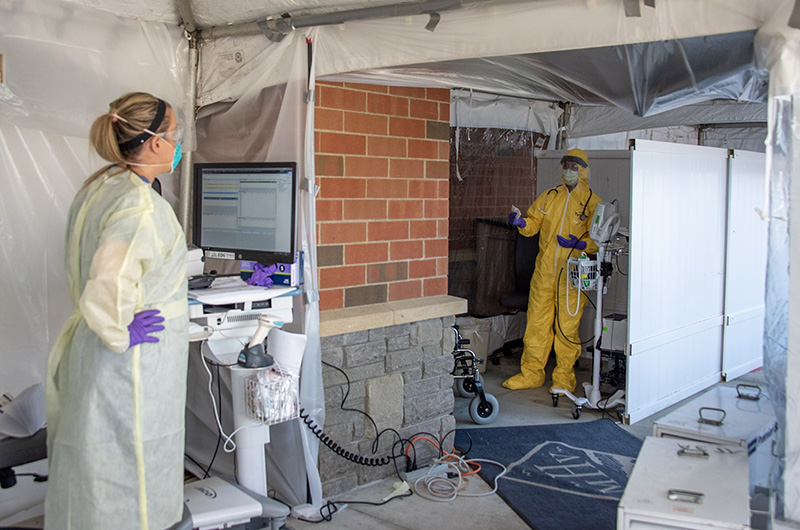
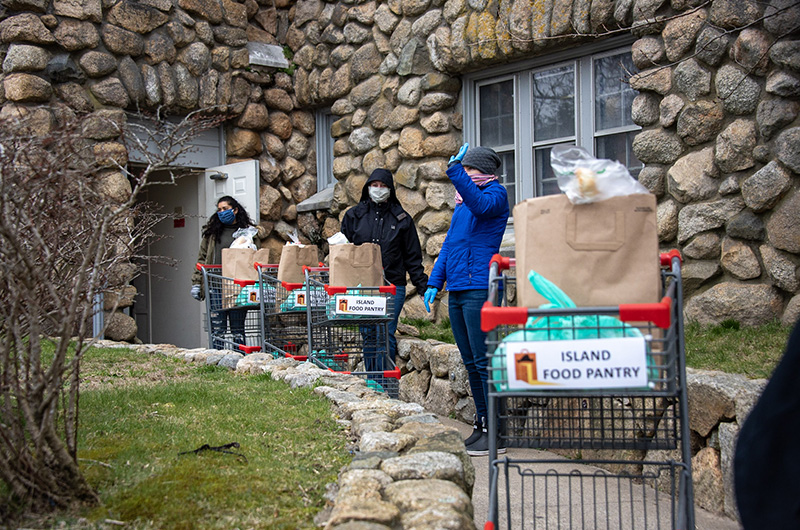

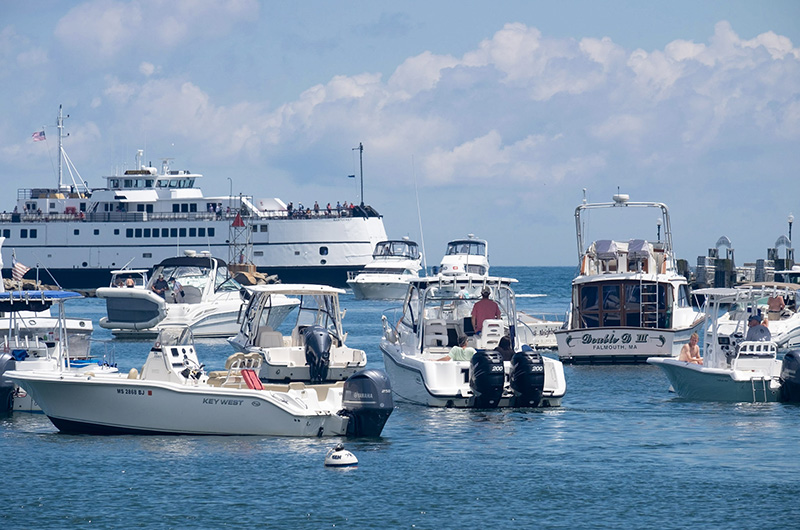

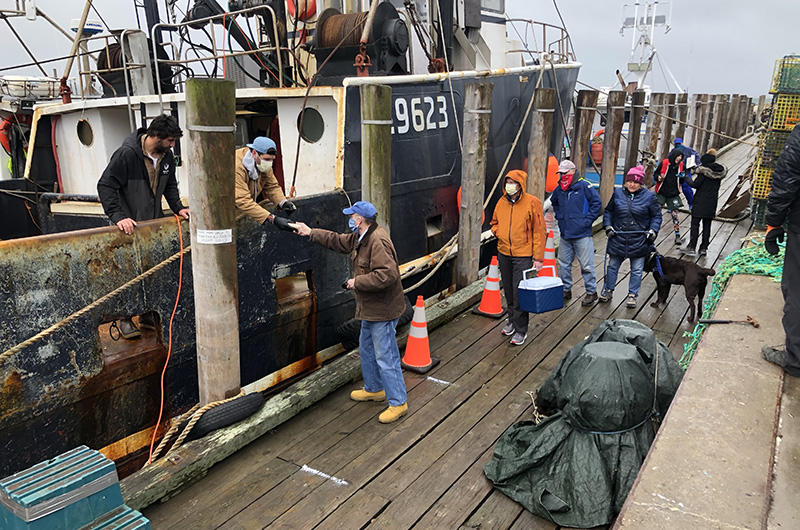





Comments (9)
Comments
Comment policy »